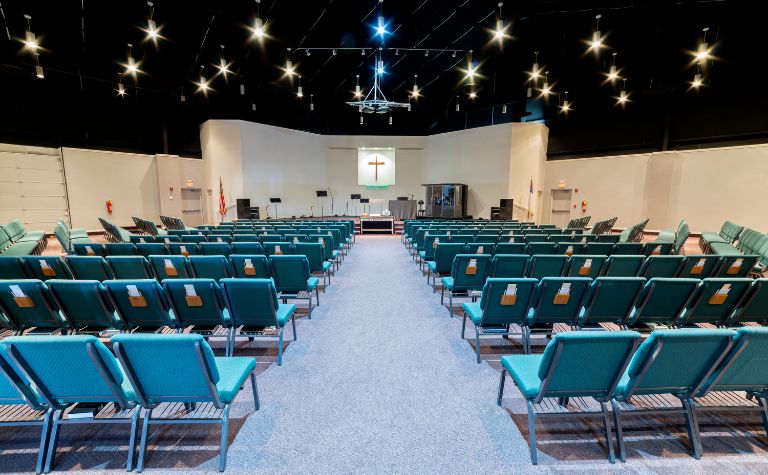The Assemblies of God is one of the fastest-growing denominations in the history of Protestant Christianity. The Roman Catholic Church has existed for 2,000 years and has over a billion members. It’s little wonder that many people want to know the similarities and differences between the two traditions.
The Assemblies of God denomination affirms the authority of Scripture and embraces Pentecostal theology. Roman Catholicism believes the Pope is the Vicar of Christ, that Scripture and tradition are both authoritative and that the elements become the body and blood of Christ in the Eucharist.
What are the central commitments of each tradition? Is the Assemblies of God conservative or liberal? What about Catholicism? Do they agree about the Trinity, baptism, and Mary? See the comparison charts below to learn more.

Assemblies of God and Catholicism Compared
The Assemblies of God tradition is over 100 years old. The Roman Catholic tradition is over 2,000 years old. The first comparison chart below provides readers with an overview of each tradition, supplying basic information, so the more in-depth charts that follow will be easier to understand. (Also see Assemblies of God vs. Pentecostal: What’s the Difference?)
| Roman Catholicism | Assemblies of God |
|---|---|
| Name: The word “Roman” is derived from the city of Rome, Italy; “Catholic” literally means “universal” or “global” or something similar. When “Catholic” is used in the context of “Roman Catholic,” it refers to the historic branch of the Christian faith. | Name: “Assemblies” refers to churches. “God” refers to the denomination’s convictions about God as the Bible reveals him. Sometimes the denomination is called “AG” or “Assemblies” for short. |
| Branch of Christianity: Catholicism traces its origins to Christ and the Apostle Peter (Matt. 16:18-19), who the church teaches was the first bishop of Rome and Vicar of Christ on Earth. | Branch of Christianity: Assemblies of God is Protestant and traces certain core convictions, like the authority of Scripture, to the Reformation. It is also Pentecostal, which is rooted in the Asuza Street Revival in Los Angeles, California, in 1906. |
| Central commitments: The Pope is the Vicar of Christ; the Trinity; Scripture and tradition are authoritative; justification involves forgiveness and sanctification; the sacraments are channels of God’s grace; Mass and the Eucharist are primary theological matters | Central commitments: The Trinity; the authority of Scripture; the atonement and resurrection of Christ; salvation is by grace through faith in Christ alone; the ministry of the Holy Spirit; all spiritual gifts are available to Christians today; baptism of the Holy Spirit occurs after conversion and speaking in tongues in the initial evidence of it; premillennial eschatology |
| Origin date: 1st century | Origin date: 20th century |
Also see Assemblies of God vs. Church of God: What’s the Difference?
| Roman Catholicism | Assemblies of God |
|---|---|
| Significant writing outside the Bible: The Catechism of the Catholic Church; the Code of Canon Law; numerous theological works | Significant writing outside the Bible: The 16 Fundamental Truths is the name of the denomination’s belief statement |
| Divisions: The Orthodox branch separated from the Catholic branch in 1054 A.D.; the Protestant branch separated from the Catholic branch beginning in the 16th century A.D.; smaller groups have also separated from the Catholic church over a variety of issues | Divisions: Compared with other large Protestant denominations, the Assemblies of God has been free of significant splits. The internal debate has occurred over a number of issues, but the denomination has avoided large protesting factions. |
| Theological and social worldview: Relative to modern sensibilities, the Catholic church is conservative theologically and socially. Some consider certain positions politically liberal, like graciousness toward illegal immigration, or theological compromising, like tolerance of Darwinian evolution. | Theological and social worldview: The Assemblies of God denomination is evangelical and conservative, theologically and socially. The denomination ordains women to be pastors, which some Christians consider liberal and progressive. |
| Global membership: 1.3 billion | Global membership: 69 million |
Also see Assemblies of God vs. Presbyterian: What’s the Difference?

Assemblies of God and Catholicism Beliefs and Practices
The Assemblies of God and the Catholic church both derive theology from the Old and New Testaments, which means they have certain overlapping beliefs. For example, both believe in the Trinity. (Also see Assemblies of God vs. Methodists: What’s the Difference?)
Yet on certain issues, they interpret Scripture differently, which leads them to different beliefs and practices. For example, the Assemblies of God believes speaking in tongues is normative for all Christians, while the Catholic church doesn’t.
| BELIEFS | Assemblies of God | Catholicism |
|---|---|---|
| God | Trinitarian. There is one God who exists in three persons. | Trinitarian. There is one God who exists in three persons. |
| Is Jesus God? | Yes | Yes |
| Is the Holy Spirit God? | Yes | Yes |
| The Bible | #1 of The 16 Fundamental Truths state, “The Scriptures, both the Old and New Testaments, are verbally inspired of God and are the revelation of God to man, the infallible, authoritative rule of faith and conduct.” | “Sacred Scripture is the speech of God as it is put down in writing under the breath of the Holy Spirit.” (Catechism 81); “Both Scripture and Tradition must be accepted and honored with equal sentiments of devotion and reverence” (Catechism 82) |
| View of the atonement | Assemblies of God believes in the penal-substitutionary atonement of Christ. His death was the punishment for sin, and he took the place of sinners on the cross. | “The Scriptures had foretold this divine plan of salvation through the putting to death of “the righteous one, my Servant” as a mystery of universal redemption, that is, as the ransom that would free men from the slavery of sin.” (Catechism 601) |
Also see Assemblies of God vs. Lutheran: What’s the Difference?
| BELIEFS | Assemblies of God | Catholicism |
|---|---|---|
| Human Leader | The Assemblies of God doesn’t recognize the Pope as the Vicar of Christ; there is no single human leader of the denomination, though there is an elected national governing counsel. Individual churches are autonomous. | Catholicism teaches that the Pope is the Vicar (i.e. representative or deputy) of Christ, as well as the head of the Church on Earth, which is an office that finds its origin in the ministry of the Apostle Peter. |
| Salvation | #5 of The 16 Fundamental Truths state, “Salvation is received through repentance toward God and faith toward the Lord Jesus Christ. By the washing of regeneration and renewing of the Holy Spirit, being justified by grace through faith, man becomes an heir of God, according to the hope of eternal life.” | “Our salvation flows from God’s initiative of love for us, because “he loved us and sent his Son to be the expiation for our sins” (I Jn 4:10). “God was in Christ reconciling the world to himself” (2 Cor 5:19)” (Catechism 620) |
| Mary | Like other Protestant denominations, the Assemblies of God honors and respects Mary, the mother of Jesus, but doesn’t believe she was sinless, raptured to heaven, or is a co-mediator with Christ. | Catholicism teaches that Mary, referred to as “the Mother of God,” was virgin born, lived a sinless life, reversed Eve’s disobedience, was a perpetual virgin, was raptured to heaven, and is an advocate and co-mediator. |
| Ordinances /sacraments | The Assemblies of God doesn’t believe the “sacraments” are channels of God’s grace; there are two – water baptism and the Lord’s Supper; the bread and cup in the Lord’s Supper are memorials and don’t transform into the body and blood of Christ. | Catholic teaching refers to these practices as “ordinances”: adult and infant baptism, confirmation, the Eucharist, penance, anointing, ordination, and marriage. These practices are channels of God’s grace, according to Catholic theology. |
| Saints | Like other Protestants, the Assemblies of God believes the word “saints” in the Bible refers to any believer. The denomination respects and learns from believers no longer living on Earth but doesn’t pray to them, but only to Christ alone. | In Catholic teaching, believers who have lived with great virtue and honor may be considered for canonization after physical death. Believers who are still living on Earth venerate the saints, in part by asking them for prayer and blessings. |
Also see Assemblies of God vs. Baptist: What’s the Difference?

| BELIEFS | Assemblies of God | Catholicism |
|---|---|---|
| Water Baptism | Believer’s baptism; only professing believers, not infants, are baptized. Baptism isn’t necessary for salvation. | “Our Lord tied the forgiveness of sins to faith and Baptism: “Go into all the world and preach the gospel to the whole creation. He who believes and is baptized will be saved.” Baptism is the first and chief sacrament of forgiveness of sins because it unites us with Christ, who died for our sins and rose for our justification so that “we too might walk in newness of life.” (Catechism 977) |
| Communion | #6 of The 16 Fundamental Truths state, “The Lord’s Supper, consisting of the elements — bread and the fruit of the vine — is the symbol expressing our sharing the divine nature of our Lord Jesus Christ, a memorial of his suffering and death, and a prophecy of His second coming, and is enjoined on all believers ’till He comes!'” | “At the Last Supper, on the night he was betrayed, our Savior instituted the Eucharistic sacrifice of his Body and Blood. This he did in order to perpetuate the sacrifice of the cross throughout the ages until he should come again, and so to entrust to his beloved Spouse, the Church, a memorial of his death and resurrection: a sacrament of love, a sign of unity, a bond of charity, a Paschal banquet ‘in which Christ is consumed, the mind is filled with grace, and a pledge of future glory is given to us.'” (Catechism 1323) |
| Spiritual gifts | Assemblies of God believes that all spiritual gifts mentioned in the Bible are operational today, including speaking in tongues, divine healing, and miracles. | Wisdom, understanding, counsel, fortitude, knowledge, piety, and fear of God [1] |
| Religious orders | The Assemblies of God doesn’t have priests or nuns. | The term describes men (e.g., priests) and women (e.g., nuns) who have fully devoted themselves to a certain form of religious life, which includes poverty, chastity, and obedience. |
| Eschatology | #14 of The 16 Fundamental Truths state, “The second coming of Christ includes the rapture of the saints, which is our blessed hope, followed by the visible return of Christ with His saints to reign on earth for one thousand years.” | “Though already present in his Church, Christ’s reign is nevertheless yet to be fulfilled “with power and great glory” by the King’s return to earth.” (Catechism 671) |
Also see Assemblies of God vs. Evangelical: What’s the Difference?
References:
[1] Source
[2] Source
[3] Source
Related Questions
The Assemblies of God and Baptist traditions are sizable and significant branches of Protestant Christianity. They each have a fascinating history in Europe, America, and as of the twenty-first...
The Assemblies of God and the Church of God (Cleveland, Tennessee) are two of the oldest Pentecostal denominations in the world. There is a lot that unites these Protestant-Christian traditions, yet...
